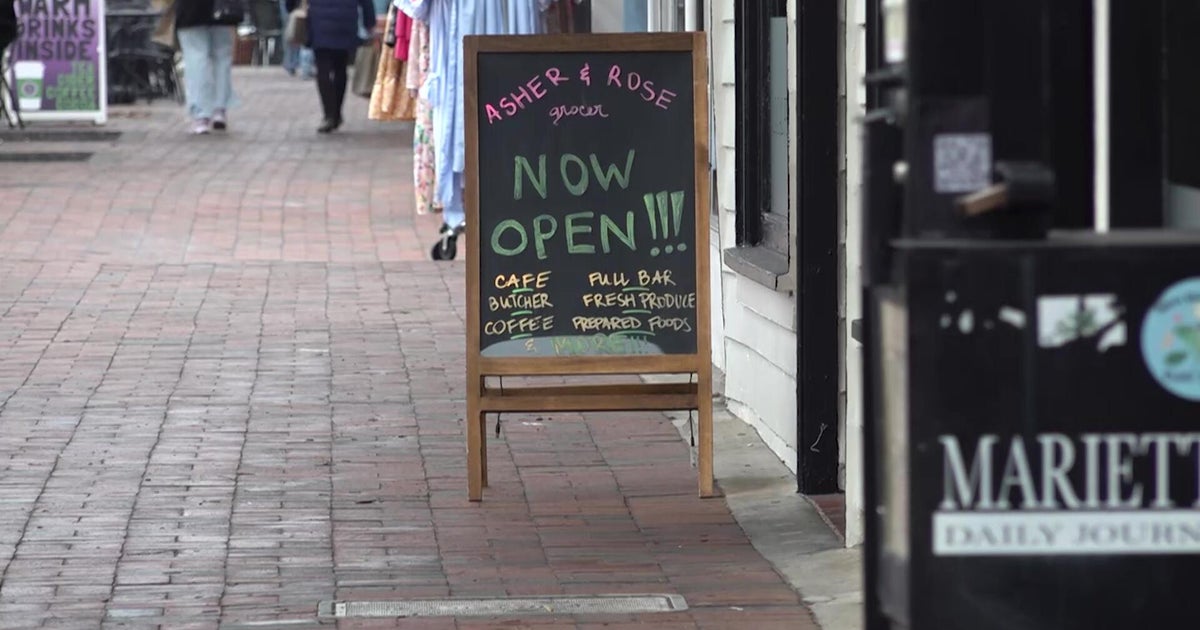Farmers will have to euthanize millions of pigs as meat plants remain closed
Food banks are experiencing unprecedented demand and some grocery stores are rationing meat during the coronavirus pandemic. But as meat processing plants remain shuttered, farmers will have to euthanize up to 10 million pigs by mid-September to avoid overcrowding, according to the National Pork Producers Council.
Many farmers take pride in raising livestock to be consumed by hungry families. Now, they are being forced to euthanize and dispose of animals with nowhere else to go, a process that is equal parts financially crippling and emotionally heartbreaking.
The National Pork Producers Council (NPPC) said last week that approximately 170,000 pigs per day cannot be sent to plants — and there is not nearly enough space to house all of them. The council called the euthanization of up to 10 million hogs in the coming months "the only humane option" to avoid overcrowding on farms, a sentiment echoed by meat companies.
An ongoing investigation found that 14,000 confirmed coronavirus cases are tied to 181 meat processing plants across the U.S., and at least 54 employees have died as of Thursday. Some plants have reopened with limited operating capacity since the Defense Production Act was enforced in late April, but many hogs have now grown too large to be slaughtered commercially, leaving farmers no way to convert them into food.
Farms cannot easily hold onto market-ready hogs due to their particularly fast growth rate. Overcrowding in hog pens can lead to aggression, and in many cases, painful deaths.
Due to the scale of the issue, the USDA is establishing a National Incident Coordination Center to help farmers euthanize and dispose of animals. Many state departments of agriculture have also updated their guidelines under the "Dead Animal Disposal Act" to give farmers more ways to dispose of carcasses following mass euthanasia events.
In late April, meatpacking company JBS announced it would be reopening a shuttered pork production facility in Minnesota to be used as a euthanasia facility. The company estimated its workers could kill 13,000 pigs each day at the facility alone.
"None of us want to euthanize hogs, but our producers are facing a terrible, unprecedented situation," Bob Krebs, President of JBS USA Pork, said in a statement announcing the reopening.
Iowa farmers raise one-third of the pigs in the U.S., with more than 6,200 farms producing nearly 50 million hogs per year. With overcapacity leaving farmers with nowhere to house newborn pigs and many plants not stepping in to handle costs, euthanasia is a last resort.
The Iowa Department of Agriculture is now working with the Iowa Pork Producers Association and Iowa State University to provide resources to farmers "as they work through difficult and emotional decisions, including animal welfare euthanasia and disposal."
"Killing animals and the food they represent 'goes against every instinct [farmers] have,' NPPC Assistant Vice President of Communications Jim Monroe told CBS News on Thursday. "Their commitment is to raise these animals for the food supply and to invest in their care, and, for reasons you have no control over to be forced to euthanize them is a tragic choice for them. I think it's particularly stressful."
"There are farmers who cannot finish their sentences when they talk about what they have to do," Minnesota farmer Greg Boerboom told The New York Times. "This will drive people out of farming. There will be suicides in rural America."
Distraught farmers are now attempting to slow down the growth of their pigs to reduce crowding and reduce the number they need to euthanize. Recommendations from the University of Minnesota advise farmers to consider changing their pigs' diets or increasing the temperature in barns to ward off hunger.
Mike Patterson, a farmer near Kenyon, Minnesota, is using every resource he has available to avoid euthanasia. He's changing his pigs' diets, selling to his community through Facebook, working with local butcher shops, donating to food pantries and renting additional barn space with a cooperative of a dozen other farmers.
"We are taking every option we have to not depopulate any pigs," Patterson told CBS News on Friday. "We do everything we can to keep our animals healthy and thriving so they can be put to good use on dinner tables all across America. Throwing them away and wasting the time, care, effort and resources goes against every fiber of our being."
Patterson said many farmers will not be able to make it through the crisis financially, but noted the emotional toll is just as devastating.
"Yes these hogs would die no matter what, but they were meant for food, not to be wasted and thrown into a compost pile. I worry about the mental health of the farmers and employees that have to carry this out. It is something that none of us want to be a part of, something none of us want to remember."
Monroe said farmers' economic losses are "astronomical" in a year that was meant to see massive profits. According to NPPC, hog farmers across the country are expected to lose $5 billion this year due to coronavirus closures. On Tuesday, House Speaker Nancy Pelosi introduced the $3 trillion HEROES Act, which includes "emergency assistance" to support farmers forced to euthanize livestock — funding that is needed to ensure a large number of farms can remain in operation.
Last month, the Department of Agriculture announced it would purchase $100 million a month in excess meat products to help support the struggling industry. It aims to distribute excess meat, as well as fruit, vegetables and dairy, to food banks and other non-profits serving struggling Americans.
"As pork, beef and chicken plants are being forced to close, even for short periods of time, millions of pounds of meat will disappear from the supply chain," Tyson Foods Chairman John H. Tyson said last month. "Farmers across the nation simply will not have anywhere to sell their livestock to be processed, when they could have fed the nation."




